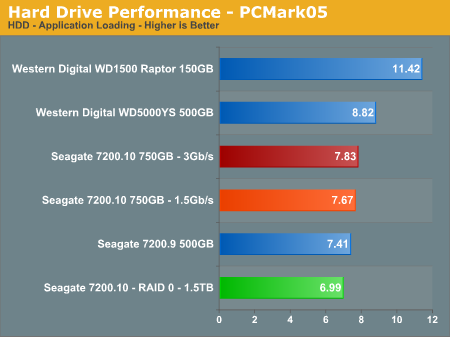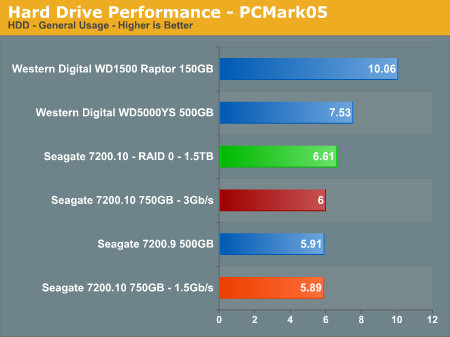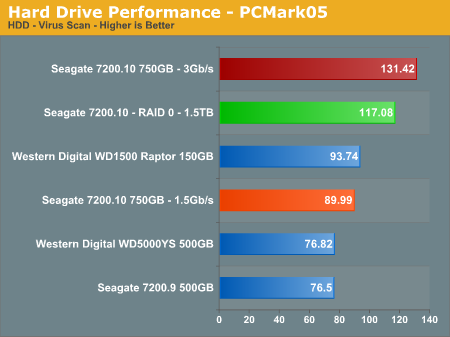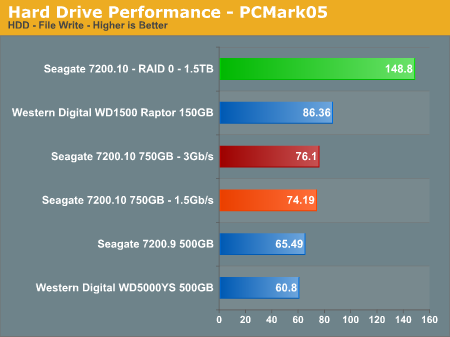Seagate Barracuda 7200.10 750GB: Size Does Matter
by Gary Key on May 18, 2006 9:00 AM EST- Posted in
- Storage
PCMark05
We are utilizing the HDD test suite within PCMark05 for further comparative hard disk scores as it provides a mixture of actual application results and specific read/write percentages utilized within these programs. The program utilizes the RankDisk application within the Intel IPEAK SPT suite of tools to record a trace of disk activity during usage of real world applications. These traces are then replayed to generate performance measurements based upon the actual disk operations within each application. The HDD test suite contains 53% read and 47% write operations with each trace section utilizing varied amounts of read or write operations. Additional information about the test suite can be found in PDF format in the PCMark05 whitepaper.Our test results are based upon the following trace runs:
Windows XP Startup: This test consists of 90% reading and 10% writes that tracks XP activities at startup.
Application Loading: This test consists of 83% reading and 17% writes that tracks the opening and closing of the following programs.
Microsoft Word
Adobe Acrobat Reader
Windows Media Player
3Dmark 2001SE
Leadtek Winfast DVD
Mozilla Internet Browser.
General Hard Disk Drive Usage: This test consists of 60% reading and 40% writes that tracks application usage utilizing the following settings.
Opening a Microsoft Word document, performing grammar check, saving and closing.
Compression and decompression using WinZip
Encrypting and decrypting a file using PowerCrypt
Scanning files for viruses using F-Secure Antivirus
Playing an MP3 file with Winamp
Playing a WAV file with Winamp
Playing a DivX video using DivX codec and Windows Media Player
Playing a WMV video file using Windows Media Player
Viewing pictures using Windows Picture Viewer
Browsing the Internet using Microsoft Internet Explorer
Loading, playing and exiting a game with Tom Clancy's Ghost Recon
Virus Scanning: This test consists of 99.5% read operations as the test tracks the scanning activities of 600MB of files for viruses.
File Write: This test consists of 100% write activities by writing 680MB of files onto the hard disk.






Our PCMark05 numbers follow the same trend with the WD Raptor having a 21% advantage over the Seagate 7200.10 750GB drive in the total score results. The performance delta of implementing SATA II/3Gb/s operation on the Seagate 750GB drive results in an impressive 9% gain over the SATA 1.5Gb/s results. However, after further examination of the numbers the only real improvement comes from the Virus scanning test which shows a 45% increase in the score. The other individual scores are well within the margin of error between benchmark sessions. In our IPEAK virus scan we did not witness the same results and believe the rather short sequential scan of 600MB in data favors the Seagate drive in this test.
The general usage and application benchmarks that represent the majority of daily operations on a typical PC configuration heavily favor the Western Digital drives. The Western Digital 500GB drive makes for an impressive showing in the first three benchmarks and then falls flat on its platter in the File Write test. The Raptor basically eats the competition in all of the benchmarks except the Virus Scan where we obviously have an aberration in the scores.
We have included the RAID 0 results for the Seagate 7200.10 drive array featuring 1.5TB of storage capability. We see a 13% increase in the XP startup benchmark, a 12% decrease in the application loading benchmark, a 1% increase in the general usage score, an 11% decrease in the Virus Scan score, and a 94% increase in the File Write results. As we have stated in previous articles the performance of RAID 0 will improve specific benchmarks but the overall performance in the general application benchmarks did not improve beyond the margin of error in these test results. Although PCMark05 is a very good benchmark, we still have to wonder exactly how the Virus Scan and File Write scores are generated based upon our test results.










44 Comments
View All Comments
Gary Key - Thursday, May 18, 2006 - link
The charts have been changed. :)
VooDooAddict - Thursday, May 18, 2006 - link
I like the "db(A)@5mm" sugestion.FallenDeathAngel - Thursday, May 18, 2006 - link
The RaptorWD1500ADFD Western Digital
Raptor
WD5000YS
Yes....
SpaceRanger - Thursday, May 18, 2006 - link
That the only drive you tested in RAID-0, was the new Seagate drive. The performace charts are kinda useless when the RAID-0 scores are included, cause it misleadingly shows the Seagate drive on top of a good portion of them. Without examples of RAID-0 performance from the WD1500 Raptor, or the WD5000YS, you are giving the impression of favoritism towards the Seagate drive.Gary Key - Thursday, May 18, 2006 - link
Good Day....from page 5-
We are providing RAID 0 results for the Seagate 7200.10 for comparative results to the single drive. Seagate has recently released updated firmware for the 500GB 7200.9 that improves RAID performance; unfortunately we were unable to complete our testing with the new firmware before publication. Our RAID results for the WD1500 series will be published in our next storage article.
We will have RAID O results for both of these drives in the 500GB roundup. We are not tyring to show favoritism towards the Seagate drive. Our comments are quite clear about the effects of RAID 0 in the I/O operations that while interesting, they do not always translate to actual 1:1 improvements in application usage. Our application timing tests bear this out to some degree.
We debated on showing the Seagate RAID 0 results as it is a no win situation. I am sure based upon the comments from our last couple of reviews that about as many people would be asking why we did not provide RAID 0 results. We are currently completing the RAID 0 results with the WD1500 drives, we ran into a couple of issues that required technical conversations with WD. Also, the sheer scope of testing every drive in RAID configurations is extremely time consuming with results that are basically the same when compared to the single drive scores.
My personal opinion is that RAID 0 is only effective in such a limited scope of applications that we should not report it at all. However, this feature has been pushed by the core logic chipset suppliers, marketed by the motherboard suppliers, and eventually becomes a test request by the user community. I would much rather show the benefits of RAID 5, 0+1, 10 in a separate article, which we will in the future. It is difficult at times to procure three samples of each drive. ;-)
I appreciate your comments, they will probably not be the last on this subject.
srk052004 - Thursday, May 25, 2006 - link
Hi Gary (and all). I have been told that for my purposes (manipulating 40gb SAS or SPSS data sets), RAID 0 really would be appropriate. Do you agree? Or, would you say that RAID 10 would still be preferable?I, too, would LOVE to see results comparing different capacities of 7200.10.
BTW, this was an interesting review.
SpaceRanger - Thursday, May 18, 2006 - link
Thank you for the quick response :)If you wants to show the comparision between RAID-0 and the Single drive, then have seperate charts showing just those 2. It makes the analysis of the performance much easier.
Now THAT'S an article I'd love to read as well!
Zoomer - Friday, May 26, 2006 - link
Ditto. It would be a nice way to split up articles into _more_ managable chunks of work!Thanks for the review! Will be looking forward to the ibm (hitachi), seagate and WD shootout.
Gary Key - Saturday, June 24, 2006 - link
We will change our format in July with the 500GB and 250~320GB roundups. I too would like to manage the chunks of work in different fashion.Questar - Thursday, May 18, 2006 - link
Then what was different than what Seagate claimed?